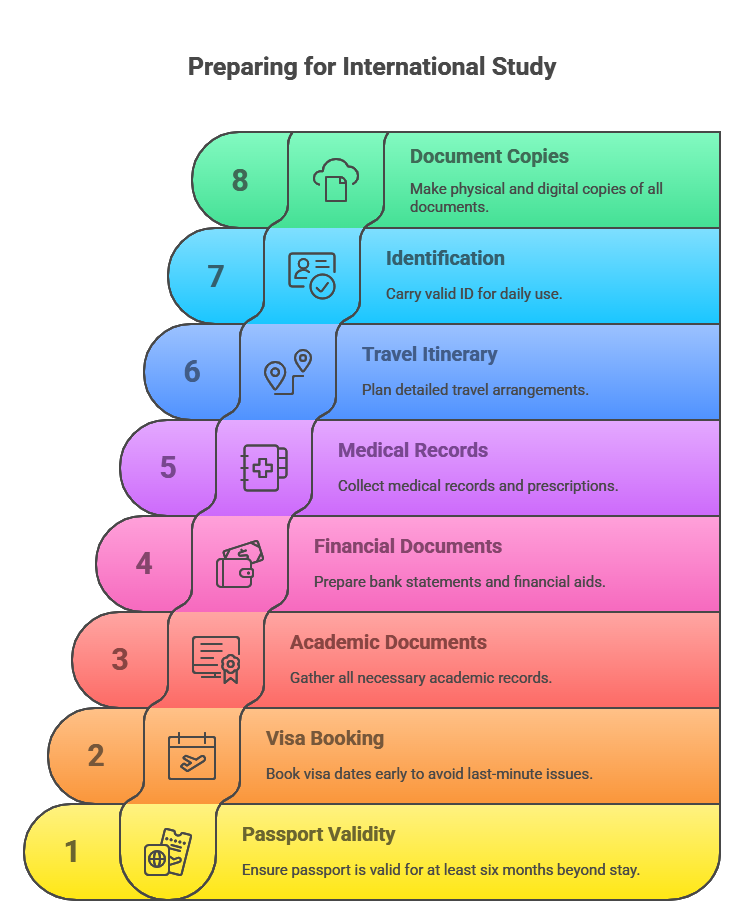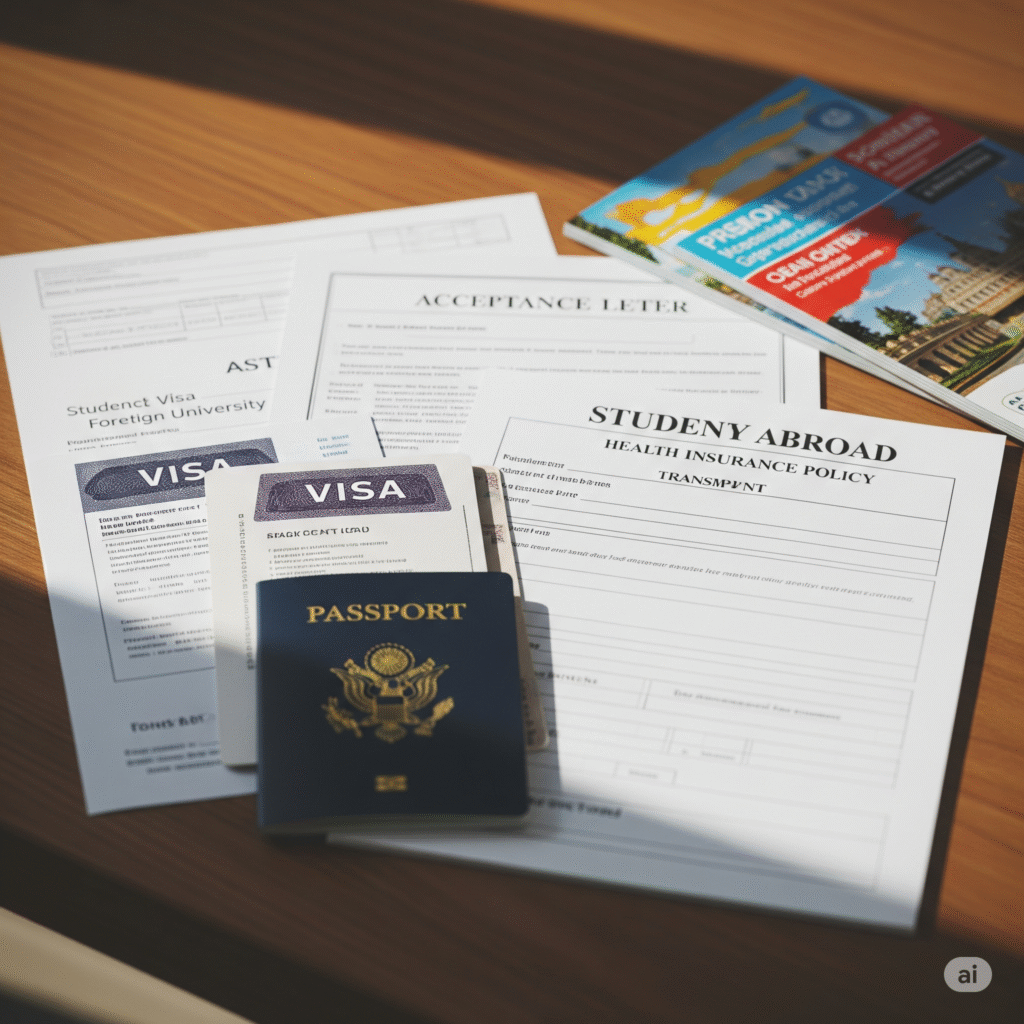Hello there, future global explorer! Planning to study abroad is such an exciting time, filled with dreams of new cultures, incredible experiences, and enriching personal growth. But let’s be honest, getting ready for this big adventure can feel a little overwhelming without a clear plan.
That’s where a comprehensive study abroad checklist comes in handy! It’s your secret weapon to staying organized, ensuring you don’t miss any crucial details, and making sure your journey is as smooth and stress-free as possible. Think of this as your friendly guide, breaking down everything you need to know before you fly. Let’s get you prepared to travel like a pro!
Your Essential Pre-Departure Checklist for Studying Abroad!
We’ve pulled together the most important steps and items, drawing on expert advice, to help you feel confident and ready for your international adventure.
1. The Paperwork Power-Up: Essential Documents!
Getting your documents in order is often the most vital, yet basic, area to focus on. Organize them in a folder or file for easy access.
- Passport: This is your golden ticket! Make absolutely sure your passport is valid and has at least six months of validity left beyond your planned return date or the duration of your stay. If you need a new one or a renewal, apply super early, as this process can take a while.
- Visa: Once you get your admission letter, book your visa dates early to avoid last-minute rushes. Double-check that your visa is correct and covers your entire stay.
- Academic Documents: Gather all your required academic documents, including original mark sheets, degree certificates, letters of recommendation, your acceptance letter, Confirmation of Enrollment (COE), and language proficiency certificates (like GRE, TOEFL, or GMAT scorecards). These are required at your university.
- Financial Documents: Keep copies of bank statements, credit cards, financial aid documents, and any international student identity cards (ISIC).
- Medical Documents: Don’t forget copies of your medical records, including vaccination certificates, blood group ID (recommended), and any prescriptions.
- Travel Documents: Have your flight tickets handy. It’s also wise to make a detailed travel itinerary with flight details, accommodation information, and university contact details.
- Other Identification: Carry your driver’s license or other valid ID; it’s helpful to avoid carrying your passport everywhere once you’re settled.
- Copies, Copies, Copies! Make physical copies of your passport, visa, and other important documents and keep them in a secure location, separate from the originals. Also, back up important documents and files in an online storage location (like Google Drive, Dropbox, or OneDrive) in case of loss or theft. Saving copies offline on your phone for easy access is also a great idea while traveling.

2. Financial Planning & Communication: Money Matters & Staying Connected!
Managing your finances and staying in touch is crucial for a smooth transition.
- Travel Currency & Prepaid Card: While cards are widely accepted, it’s always smart to have some local cash in various denominations, especially when you first land. About $500 of the respective currency in hand is often recommended. Get a prepaid card in the local currency before you leave. Debit and credit cards are also considered safe ways to carry money abroad.
- Notify Your Bank: Before you go, let your bank and credit card companies know you’ll be traveling abroad. This helps them flag your account for international transactions and prevents any potential fraud or security issues.
- Budget & Finance: Create a detailed budget covering tuition, accommodation, food, transportation, and leisure activities. Research currency exchange rates and banking options in your destination country.
- Smart Saving Tips: Consider affordable housing like university dorms or shared accommodations. Research part-time job options to earn extra money (but balance with studies!). Explore student loans cautiously. Always carry your student ID to take advantage of student discounts on services, products, transport, and entertainment. Opt for public transport, walking, or cycling to save on transportation costs. Look into monthly or seasonal travel passes. Shop during sales for essentials. Cook your meals instead of eating out frequently. Use credit cards wisely, sticking to your budget.
- International SIM & Roaming: You can buy an international SIM card from India through online services like Matrix, OneSimCard, or GigSky. It’s also wise to activate international roaming on your local SIM as a backup. Getting a new SIM or bank account in a foreign country can sometimes take time due to credit checks and address proof. Check your device’s compatibility with foreign SIMs.
3. Travel & Accommodation: Smooth Arrivals & Settling In!
Making your travel and initial living arrangements seamless is key.
- Flight Tickets: Book your flights early for the best deals. When choosing, consider factors like baggage allowance, layover time, and flight duration. Some airlines offer more baggage allowance. Remember, your laptop usually doesn’t count towards carry-on weight limits.
- Accommodation Arrangement: Book accommodation early based on your budget and preferences, such as university dormitories or shared housing. Confirm your accommodation arrangements before departure so you have a residence ready upon arrival. Have a copy of your housing information, like a rent agreement, with you.
- Airport Pick-up: Some universities offer airport pick-up services, which can be a huge help with heavy luggage. If not, have a printout of how you’ll travel to your first accommodation from the airport.
- Research Public Transport: Take a little time to research public transport options in your destination city beforehand. This can give you a significant head start and reduce guesswork when you arrive.
- Pack Like a Boss: Label all your luggage to avoid confusion. Try not to take more than two large luggage bags. Check with your airline for specific weight limits on luggage and restricted items.
4. Health & Well-being: Staying Healthy Away From Home!
Your health is paramount, so prepare for any medical needs.
- Travel and Health Insurance: Purchase comprehensive travel insurance that includes medical coverage, trip cancellation, and lost luggage protection. Be aware that some countries (like the UK, Canada, Australia) have specific government-mandated student health insurance plans or surcharges. If you have your health insurance card, keep it accessible for faster claims. It’s a “strict no-no” to travel without insurance papers.
- Vaccinations: Obtain any required vaccinations before leaving your home country.
- Medical Records & Medicines: Get copies of your medical records and prescriptions. If you’re undergoing treatment, carry enough prescribed medicine with you, along with your doctor’s prescription, in case you run out.
- General Medicines: Pack common over-the-counter medicines for headaches, colds, coughs, and other minor ailments. Examples include Paracetamol, antibiotics, antacids, painkillers, anti-allergies, antiseptic, bandages, cough syrup, and Dettol. Ensure the brands you carry are legal in your destination country. It’s best to pack a surplus amount as some medicines might be expensive or unavailable abroad.
5. Packing Smart: What to Bring & What to Leave!
Packing can be tricky, but these tips will help you pack efficiently and avoid issues.
- Clothing: There’s no specific “right” list, but pack clothes appropriate for the climate. A good tip is not to overfill your luggage with bulky items like jackets, as they might be cheaper or better abroad. Include essentials like: T-shirts/tops, two weeks’ worth of socks and undergarments, shorts, pants, jeans, skirts, swimsuits, pajamas, sweaters, hoodies, two coats or jackets (one water-resistant, one for cold), at least four formal outfits, various shoes (trainers, dress shoes, walking shoes, flip-flops), and cold weather clothing (mittens, gloves, hats, scarves) if appropriate for your host country.
- Electronic Devices & Adapters: Bring your laptop for studying. Don’t forget necessary adapters and chargers for international outlets, and a power bank. Other devices like your phone, tablet, headphones, and smartwatches are also useful. Consider a hard drive for extra storage. It’s a good idea to keep all your electronics in your carry-on.
- Essential Travel Accessories: Pack items to make travel convenient: a waist bag/sling bag for essentials, packing cubes for organization, a neck pillow for comfort, a digital luggage scale, a daypack, large and cabin-sized suitcases, luggage tags, luggage locks, toiletry bags, travel adapters and power converters, sunglasses, a travel umbrella, and a diary/journal.
- Toiletries: Carry some essentials like a hairbrush/comb, toothbrush, deodorant, make-up, contact lenses, tissues, razors (in checked luggage!), mask, hand sanitizer, toothpaste, and face wash. Carry extras, and use Ziploc bags for toiletries to prevent contamination and spills.
- Snacks & Comfort Food: While packaged Indian snacks are often available in major destinations, it can be nice to take some homemade dry food and snack items for when you miss home food. You might also want to bring some of your favorite herbs and spices.
- Kitchen Necessities: If you plan to cook, you might want to pack some basic kitchen items like a pressure cooker, saucepans, or coffee mugs, especially if you’re concerned about finding them easily.
- Miscellaneous: Think about extras like hangers, bed sheets, linens, bath towels, a sleeping bag, air pillows, passport-sized photographs, a diary, and stationery items.
- What NOT to Pack (Seriously, Avoid These!):
- Certain Plant/Animal Products: Many countries restrict importing seeds, cuttings, live plants, or even milk-based products like ghee and butter.
- Large or Expensive Electronics: While tempting, they can be targets for theft and difficult to replace.
- Excessive Cash or Expensive Jewelry: Carrying large amounts makes you a target for theft, and it can be hard to exchange or transfer funds.
- Anything that might be considered a weapon.
- Pirated Goods or Movies.
- Illegal Drugs: Possession of illegal drugs is a serious offense in most countries and can lead to severe penalties, including imprisonment. This is non-negotiable.
6. Connecting & Adapting: Embrace Your New Adventure!
Being open and prepared for your new environment will make a huge difference.
- Connect Locally: The first few months can be lonely, so if you can, try to connect with an Indian family known through a friend or relative. You might be surprised by the connections you build.
- Language Skills: If you’re going to a non-English speaking country, learn some basic phrases in the local language. Download a language translator app for instant use. Basic proficiency helps with communicating with locals.
- Research Local Culture & Laws: Familiarize yourself with the local culture, customs, and laws of your study abroad destination. Be open to new experiences, whether it’s local cuisine or different festivals.
- Emergency Contact Details: Keep a list of emergency contacts both at home and in your destination country. This includes local emergency services, embassy contacts, and family/friends. Store this information securely and accessibly.
- Safety Precautions: Check travel advisories for your destination. When arriving at the airport, take taxis only from official taxi stands, as some countries are known for taxi scams. Save emergency numbers in your phone; often, calling 911 in many countries abroad will transfer to their local emergency contact number.
7. Before You Go: Final Touches for Peace of Mind!
A few last things to check off before you head out!
- Take Care of Loose Ends at Home: Pay any outstanding bills or handle other responsibilities you have at home before you leave. This helps you focus entirely on your studies abroad.
- Be Organized! Continue to use your checklist! It’s crucial to stay organized with all the paperwork, emails, and important documents. Keep track of deadlines and communicate with relevant people.
- Be Open & Committed: Studying abroad offers different experiences – some good, some challenging. Prepare yourself mentally to welcome changes with positivity. Remember to be committed to your chosen program; you’ll have plenty of time on weekends to explore and enjoy.
Preparing for study abroad is a big undertaking, but by diligently following this checklist, you’re setting yourself up for a smooth and stress-free experience. It’s about being prepared, organized, and excited for the incredible journey ahead.
Enjoy every moment, meet new people, and seize this unique adventure of a lifetime! Happy travels!









